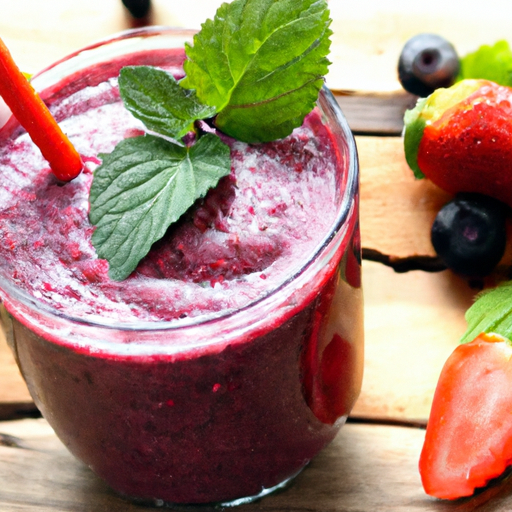Are you ready to indulge in guilt-free pleasure? Look no further than Nature’s Candy, the perfect solution for those seeking heavenly taste without the added sugar. These sugar-free diet smoothies are bursting with vibrant flavors that will satisfy your cravings while keeping your waistline in check. Packed with nutrient-rich ingredients and sweetened naturally, these sinfully delicious smoothies are the guilt-free treat you’ve been waiting for. Get ready to savor every sip and nourish your body with Nature’s Candy.
1. Why Choose a Sugar-Free Diet?
Cutting sugar from your diet can have numerous benefits for your overall health and well-being. By choosing a sugar-free diet, you can improve your energy levels, support weight loss goals, and reduce the risk of chronic diseases. Let’s explore the benefits of a sugar-free diet, the impact of excess sugar consumption, and the health risks associated with sugar intake.
1.1 Benefits of a Sugar-Free Diet
Adopting a sugar-free diet can bring about several benefits for your body and mind. Firstly, reducing sugar intake can help stabilize your energy levels throughout the day. Unlike the quick spike in energy that you may experience from consuming sugary foods, a sugar-free diet promotes more consistent energy levels, preventing the dreaded sugar crashes.
Furthermore, a sugar-free diet can also aid in weight loss efforts. High sugar consumption can lead to weight gain due to the excess calories and the body’s insulin response. By cutting out sugar from your diet, you can eliminate these unnecessary calories and reduce the risk of overeating.
Moreover, a sugar-free diet can help maintain stable blood sugar levels, which is especially vital for individuals with diabetes or those at risk of developing the condition. By avoiding refined sugars and opting for healthier alternatives, you can better manage blood sugar levels and reduce the need for medication in some cases.
1.2 Impact of Excess Sugar Consumption
Eating too much sugar can have negative effects on your health. When you consume excess sugar, it is absorbed rapidly into your bloodstream, causing a sharp rise in blood sugar levels. This triggers an insulin response from the body, which helps transport the sugar from the bloodstream into cells for energy or storage.
However, when we consistently consume more sugar than our body needs, it can lead to insulin resistance. This means that the body becomes less responsive to insulin, resulting in increased blood sugar levels and potentially leading to the development of type 2 diabetes.
Additionally, high sugar consumption has been linked to weight gain, obesity, and an increased risk of heart disease. Sugary foods tend to be high in calories and low in nutrients, causing us to feel less satisfied and more likely to overeat. This can contribute to weight gain and an increased risk of developing heart conditions.
1.3 Health Risks Associated with Sugar Intake
Consuming excessive amounts of sugar has been linked to various health risks. These risks include an increased risk of type 2 diabetes, heart disease, obesity, tooth decay, and even certain types of cancer. By reducing your sugar intake and opting for a sugar-free diet, you can significantly lower your risk of developing these chronic conditions.
Excess sugar consumption has also been associated with inflammation in the body. Chronic inflammation can lead to a range of health issues, including autoimmune diseases, digestive disorders, and even mental health conditions like depression and anxiety. By adopting a sugar-free diet, you can promote overall health and reduce the risk of inflammation-related issues.

2. Understanding Natural Sweeteners
If you’re considering a sugar-free diet, you may be wondering how to replace the sweetness in your favorite smoothies. The good news is that there are plenty of natural sweeteners to choose from. From stevia to monk fruit, understanding these natural alternatives can help you make the right choice for your smoothies. Let’s take a closer look at natural sweeteners, their various types, and how to choose the right one for your smoothies.
2.1 Introduction to Natural Sweeteners
Natural sweeteners are derived from various plant sources, such as fruits, flowers, and tree sap. Unlike refined sugars, these alternatives often have lower calorie content and are less likely to cause blood sugar spikes. Natural sweeteners can provide a delicious sweetness to your smoothies without the negative health effects associated with excessive sugar consumption.
2.2 Types of Natural Sweeteners
There are several types of natural sweeteners available, each with its own unique properties and flavor profiles. Some of the most popular ones include:
-
Stevia: Derived from the leaves of the stevia plant, stevia is a zero-calorie sweetener that is significantly sweeter than sugar. It is available in both liquid and powder form and can be used as a direct substitute for sugar in your smoothies.
-
Monk Fruit: Also known as luo han guo, monk fruit is a naturally sweet fruit native to Southeast Asia. The extract from monk fruit is intensely sweet and contains zero calories. It is often available in liquid form or as a powder and can be used as a sugar substitute in smoothies.
-
Erythritol: Erythritol is a sugar alcohol that occurs naturally in certain fruits and fermented foods. It has a similar taste to sugar but with only a fraction of the calories. Erythritol does not raise blood sugar levels and is well-tolerated by most individuals, making it a suitable choice for diabetics.
-
Xylitol: Xylitol is another sugar alcohol that is commonly used as a sugar substitute. It has a sweetness similar to sugar and is often derived from birch bark or corn. Xylitol is known for its dental health benefits, as it can help prevent tooth decay by inhibiting the growth of harmful bacteria.
-
Allulose: Allulose is a low-calorie sugar alternative that occurs naturally in small quantities in certain foods. It has a taste and texture similar to sugar but with fewer calories. Allulose is known for its ability to create a creamy texture in recipes, making it an excellent choice for smoothies.
-
Coconut Sugar: Coconut sugar is derived from the sap of coconut palm trees. It has a delicious caramel-like flavor and is considered a more nutritious alternative to refined sugar. Although it still contains calories and should be consumed in moderation, coconut sugar provides trace amounts of minerals and fiber.
-
Date Paste: Date paste is made by blending dates with water until a smooth consistency is achieved. It is a whole food sweetener that retains the fiber and nutrients naturally present in dates. Date paste adds a natural sweetness to smoothies while also providing additional health benefits.
-
Maple Syrup: Maple syrup is a natural sweetener made from the sap of maple trees. It is rich in antioxidants and provides a unique, rich flavor to smoothies. Make sure to choose 100% pure maple syrup without any added sugars or artificial flavors.
-
Honey: Honey is a sweetener produced by bees from the nectar of flowers. It has been used for centuries for its health benefits and sweet taste. Honey contains antioxidants and has antibacterial properties, making it a popular choice for enhancing the flavor of your smoothies.
2.3 Choosing the Right Natural Sweetener for Your Smoothies
When selecting a natural sweetener for your smoothies, consider factors such as taste preference, sweetness level, and any dietary restrictions you may have. Experiment with different sweeteners to find the ones that best complement your smoothie recipes. Keep in mind that some sweeteners may be more suitable for specific dietary needs, such as diabetics or individuals following a vegan or gluten-free diet.

3. Exploring Sugar Alternatives for Smoothies
Now that you have a better understanding of natural sweeteners, let’s explore some specific sugar alternatives that you can use in your smoothie recipes. From stevia to date paste, here are some popular options to add delicious sweetness to your sugar-free smoothies.
3.1 Stevia: The Zero-Calorie Sweetener
Stevia is a popular sugar substitute known for its zero-calorie content. Derived from the leaves of the stevia plant, it is a natural alternative to refined sugar. Stevia tastes incredibly sweet and can be up to 200 times sweeter than sugar, so a little goes a long way. Unlike artificial sweeteners, stevia is considered safe to consume and has no known negative health effects. It is available in both liquid and powder form, making it convenient to use in smoothies.
3.2 Monk Fruit: The Naturally Sweet Option
Monk fruit, also known as luo han guo, is a fruit native to Southeast Asia and has been used as a natural sweetener for centuries. Monk fruit extract is intensely sweet and contains zero calories, making it an excellent choice for those following a sugar-free diet. It is available in liquid or powder form and can be used to sweeten smoothies without contributing to any blood sugar spikes.
3.3 Erythritol: The Diabetic-Friendly Choice
Erythritol is a sugar alcohol that occurs naturally in certain fruits and fermented foods. It has a taste and texture similar to sugar but with only a fraction of the calories. Unlike other sugar alcohols, erythritol does not raise blood sugar levels or cause digestive issues in most individuals. This makes it a suitable choice for those with diabetes or people watching their carb intake. Erythritol is available in granulated form and can be easily added to smoothies for a touch of sweetness.
3.4 Xylitol: The Dental Health Booster
Xylitol is a sugar alcohol that has gained popularity not only for its sweetness but also for its dental health benefits. Derived from birch bark or corn, xylitol tastes similar to sugar and can enhance the flavor of your smoothies without causing significant spikes in blood sugar levels. Xylitol has been shown to inhibit the growth of harmful bacteria in the mouth, reducing the risk of tooth decay. It can be found in granulated form and can be added to your smoothies for a natural and tooth-friendly sweetener.
3.5 Allulose: The Low-Calorie Sweetener
Allulose is a low-calorie sugar alternative that occurs naturally in small quantities in certain foods, such as wheat, figs, and raisins. It has a taste and texture similar to sugar but with fewer calories. Allulose provides a delicious sweetness to smoothies without contributing to weight gain or blood sugar spikes. One of the unique properties of allulose is its ability to create a creamy texture in recipes, making it an excellent choice for achieving a velvety smoothness in your sugar-free smoothies.
3.6 Coconut Sugar: The Nutrient-Rich Option
Coconut sugar is derived from the sap of coconut palm trees and has gained popularity as a more nutritious alternative to refined sugar. It has a delicious caramel-like flavor and can be used as a direct substitute for sugar in smoothies. Coconut sugar contains trace amounts of minerals such as iron, zinc, calcium, and potassium. While it is still a form of sugar and should be consumed in moderation, coconut sugar provides a more nutrient-rich option for sweetening your smoothies.
3.7 Date Paste: The Whole Food Sweetener
Date paste is made by blending dates with water until a smooth consistency is achieved. It is a whole food sweetener that retains the fiber and nutrients naturally present in dates. Date paste adds a natural sweetness to smoothies, along with a touch of caramel-like flavor. In addition to its sweetening properties, date paste provides antioxidants, fiber, and essential minerals. With its natural sweetness and health benefits, date paste is an excellent choice for those looking to incorporate whole foods into their sugar-free smoothie recipes.
3.8 Maple Syrup: The Natural Flavor Enhancer
Maple syrup is a natural sweetener made from the sap of maple trees. It is known for its unique and rich flavor, which can add depth to your smoothies. While maple syrup contains calories, it offers more nutritional value than refined sugar. It is rich in antioxidants and provides trace amounts of minerals such as manganese, zinc, and potassium. When choosing maple syrup for your smoothies, make sure to opt for 100% pure maple syrup without any added sugars or artificial flavors.
3.9 Honey: The Antioxidant Powerhouse
Honey is a sweetener produced by bees from the nectar of flowers. It has been used for centuries for its health benefits and delicious taste. Honey contains antioxidants, enzymes, and antibacterial properties, making it a popular choice for enhancing the flavor of your smoothies. While honey does contain calories and should be consumed in moderation, it provides additional health benefits compared to refined sugar. Choose raw and unfiltered honey to maximize its nutritional value.

4. Must-Try Sugar-Free Smoothie Recipes
Now that you’re familiar with sugar alternatives, let’s dive into some mouthwatering sugar-free smoothie recipes. These recipes are packed with nutrients, use natural sweeteners, and are designed to be both delicious and satisfying. Whether you’re looking for a refreshing berry blast or a creamy caramel dream, there’s a recipe for everyone to enjoy.
Stay tuned for the continuation of this article…


